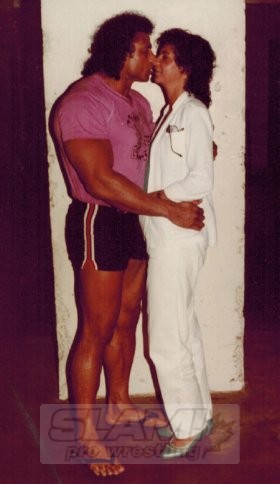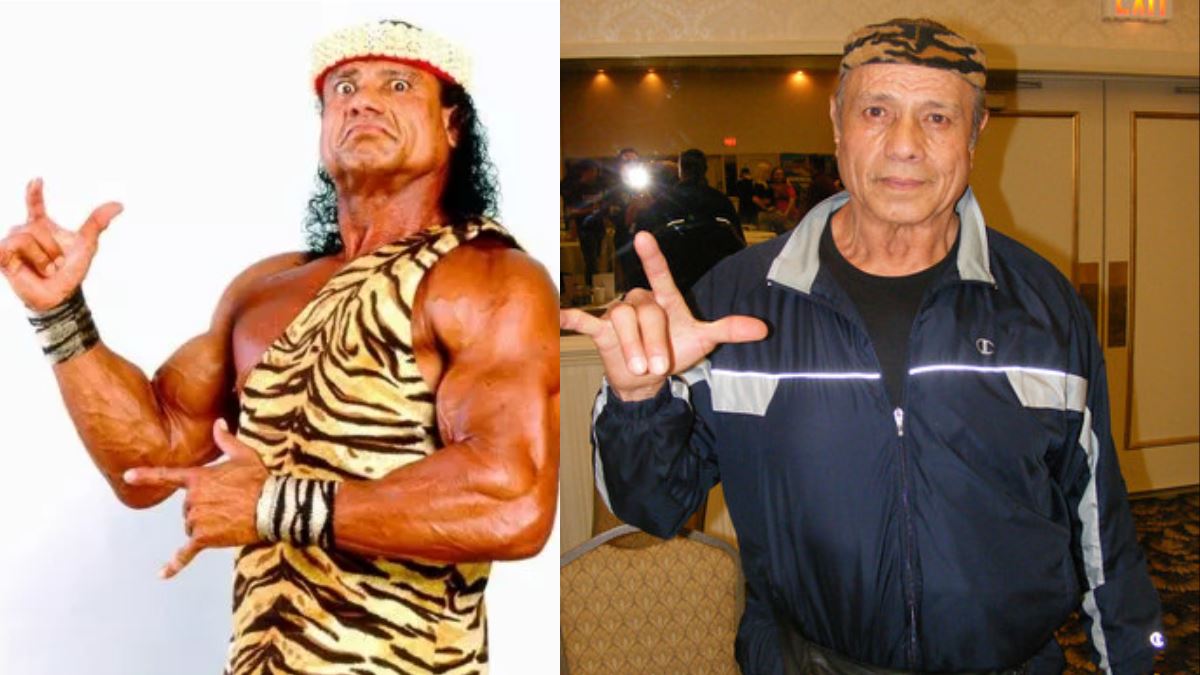Ah, what a wonderful world it would be, if a reviewer of VICE TV’s Dark Side of the Ring episode on the 1983 Jimmy “Superfly” Snuka-Nancy Argentino murder case — a reviewer with his own strong perspective 28 years after becoming the first journalist to probe this story in earnest — could simply list where he felt the documentary succeeded and where it fell short.
As I’ll proceed to explain, the Snuka piece actually does a decent job of establishing the wrestler’s guilt, for anyone who hadn’t yet been paying attention and isn’t a complete Snuka mark or WWE or industry apologist.
Alas, this essay doesn’t live in such a wonderful world. It lives, instead, in the world of pro wrestling, its own peculiar milieu of rule-bending and deception, as interpreted by the flabby standards of documentary television production — in other words, rule-bending and deception squared. Therefore, it is my task to offer a more blunt and overriding takeaway from my screening last night.
While Dark Side of the Ring left the overriding impression that Snuka did it, and even ambushed two new voices into inadvertently revealing as much, executive producer Evan Husney and crew also left on the cutting-room floor the most important points I had made in our sit-down interview last October in Las Vegas.
But worse than the show itself was their cut-and-paste mash-up of a post-show panel discussion, in which I was pitted with those well-known criminologists and seventh-hand witnesses: Greg “The Hammer” Valentine and Brian “Nasty Boy” Knobbs. There, the VICE team violated their representation to me, prior to our April 3 taping, of a “live to tape” session. Blatantly, shamelessly, they censored almost every single supplementary remark I made. All of them were both accurate and measured.
Before untangling all this, let’s review the basics for readers encountering for the first time one of wrestling’s signature legacy scandals.
On May 10, 1983, Argentino died of a traumatic brain injury in Room 427 of the George Washington Motor Lodge in Whitehall, Pennsylvania, just outside Allentown. She was sharing the room with her boyfriend Snuka, who was in town for the then World Wrestling Federation’s tri-weekly syndicated television tapings at the Lehigh County Fairgrounds Agricultural Hall.
On a reporting trip to the area nine years later — for an article first published online that would become a chapter of my 2007 book Wrestling Babylon — I sketched a cover-up by the Whitehall Township police and the Lehigh County district attorney, likely tied to WWF’s local economic impact and influence.
The county coroner, Wayne Snyder, told me, “Upon viewing the body and speaking to the pathologist, I immediately suspected foul play and so notified the district attorney.” The Allentown Morning Call reporter who had written the same-day story on the Argentino death, Tim Blangger, told me that the chief investigating detective for Whitehall, Gerald Procanyn, had speculatively reenacted for Blangger the prevailing theory: Snuka, during an altercation with Argentino, had shoved her, perhaps more forcefully than intended, causing her head to strike the wall or a blunt object. (But any possible accidental dimension to Snuka’s agency must be weighed against his documented history of domestic violence, including mate abuse of Argentino, and against the bruises and markings evident throughout her body.)
To me, Detective Procanyn spewed a series of easily exposed lies. He said Snuka had told a single consistent story — that Nancy had slipped and fallen during a roadside pee stop while driving into town — when the record clearly showed that the wrestler had given multiple, incoherent accounts to hospital employees and to the police themselves. Procanyn further volunteered the Five Pinocchios assertion that the Argentino family had never raised a peep of a complaint — even though they commissioned two private investigations challenging the failure to prosecute Snuka, and in 1985 sued Snuka for wrongful death in federal court, winning a $500,000 default judgment.

Flash forward to 2013. The Morning Call got religion and published a long article raising questions about why the Superfly had gotten off the hook. The newspaper left out a few inconvenient details, however. One was the simple fact that, notwithstanding its newly hyped acquisition of the forensic pathologist’s report from the civil case discovery archives, the fundamentals of the story were exactly the same as those in 1983. Not to mention that nine years later I met with a group of Morning Call reporters and editors, and subsequently published coroner Snyder’s on-the-record statement and otherwise drew a road map.
So: Whose “cold case”?
Another telling omission from the 2013 Morning Call article: It didn’t note that the long-time Lehigh County DA, James Martin, had been an assistant under the DA, William Platt, who whiffed on busting Snuka. This point went to more than my vanity — it would have shone light on the general corruption of the county’s criminal justice system. Detective Procanyn, for example, after retiring from the Whitehall force and starting to collect his municipal pension, would double-dip as an investigator in Martin’s office. The DA’s top lay aide, Debbie Garlicki, came through the revolving door following a stint as the Morning Call‘s courthouse reporter. Even today, as I type this, Martin is using either public funds or a cronies’ slush fund to bankroll, as a “private citizen,” a years-long, groundless, harassing defamation lawsuit against a critical blogger named Bill Villa, whose daughter had been killed by a well-connected drunk driver who received a slap on the wrist from Martin for vehicular homicide. First Amendment advocates call this a “SLAPP” suit, for Strategic Lawsuit Against Public Participation, a practice outlawed and carrying court sanctions in many states, but not Pennsylvania.
* * *
When Dark Side of the Ring booked me for the talk-back panel after-show, called After Dark, I was given preview access to the documentary. To my disappointment, the episode made a much bigger deal out of the 2013 Morning Call article than I thought was warranted. The 2015 grand jury indictment of Snuka, for third-degree murder and involuntary manslaughter, should not be regarded as some sort of triumphant punch line; rather, it was a classic case of “justice delayed, justice denied.” And indeed, weeks prior to Snuka’s death from stomach cancer in 2017, a Pennsylvania Court of Common Pleas judge would, understandably, dismiss the charges on grounds of the defendant’s mental incompetency.
Still, the after-show ostensibly afforded me a second bite out of the apple. After answering the first question from host Chris Gethard, I said I wanted to make more expansive remarks that hadn’t made the cut of the just-aired doc.
“OK, the floor is yours,” Gethard replied.
I started by praising the episode in general and calling attention to two particular positive aspects. One was the interview with Frederic Conjour, the retired chief of the Whitehall police, who made a complete fool of himself by contending that Snuka’s kaleidoscopic accounts bore no significance for a case with compelling circumstantial evidence. The other was a clip of Sam Fatu, the Tonga Kid, recalling that he was a second passenger in the car driving into town, with Argentino behind the wheel and Snuka as the other passenger, and there was no stop by her to urinate by the roadside.
Then I said this:
The unfortunate thing, in my view, is that they allowed two Allentown Morning Call reporters to preen and hype a 30th anniversary cold case story that they did in 2013, when the facts clearly show that the Allentown Morning Call had every opportunity to write the same story 30 years earlier, in real time, as the crime happened. And they certainly had no excuse not to pursue that story after my 1992 investigative trip to the Allentown area that was published online in the nineties and in my 2007 book Wrestling Babylon.
Now, the reporters did come up with new details and a good story, no question about that. Unfortunately, they continue to enable the culture of cronyism and cover-up in the criminal justice system of Lehigh County, Pennsylvania, that is the real story here. Justice delayed, justice denied.
And it’s important because the district attorney who is still there and has been reelected many times, James Martin, was the assistant district attorney in 1983 — a fact that the Allentown Morning Call never shared with its readers.
To this, host Gethard said, “I think it’s a fair point.”
The entire foregoing exchange got vaporized in post-production. So did multiple others. At my website ConcussionInc.net, I’ll be writing more of the specifics of what Dark Side of the Ring After Dark censored from my interview, after inducing me to participate in the show with the assurance that it was a “live to tape” undertaking.
Cutting a promo, the late great villain manager Captain Lou Albano once said, “Jimmy Snuka has the brain of a dehydrated BB. If you put Jimmy Snuka’s brain inside the head of a parakeet, the parakeet would fly backwards.”
Where, oh where, is Captain Lou when you need him most — in my case, to cast pith at the shoddy journalism and ethics-free tactics of VICE TV’s Dark Side of the Ring?
RELATED LINKS
Snuka comes crashing down in Dark Side of the Ring’s The Death of Nancy Argentino
- Irv Muchnick’s CONCUSSION INC. website
- Irv Muchnick on Twitter: @irvmuch
- Jimmy “Superfly” Snuka story archive
- Guest Column story archive
JUSTICE DENIED: The Untold Story of Nancy Argentino’s Death in Jimmy “Superfly” Snuka’s Hotel Room, annotates Muchnick’s original 1992 article and benefits a women’s shelter in Nancy’s memory. You can order the ebook for $2.99 on Amazon Kindle or a PDF copy by email (send $2.99 via PayPal to nancyargentino@gmail.com). One hundred percent of the proceeds are donated by the Argentino family, in Nancy’s memory, to the women’s shelter in development at the Salerno, Italy, church Centro Evangelical dei Fratelli. Muchnick’s website is ConcussionInc.net. WRESTLING BABYLON: Piledriving Tales of Drugs, Sex, Death, and Scandal was published by ECW Press in 2007.

